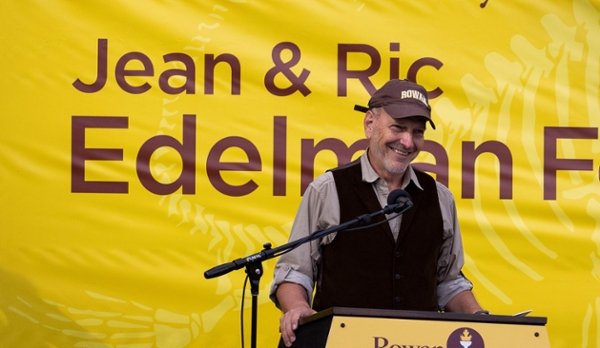Rowan’s Lacovara joins scientific advisory board of company seeking to revive lost species
Rowan’s Lacovara joins scientific advisory board of company seeking to revive lost species

Dr. Kenneth Lacovara, founding dean of Rowan University’s School of Earth & Environment and executive director of the Jean & Ric Edelman Fossil Park & Museum, has joined the scientific advisory board of Colossal Biosciences, a Texas-based company that, using DNA editing technology, seeks to return some extinct species to life.
The company announced Aug. 16 that it aims to use the CRISPR gene editing tool to “de-extinct” the Thylacine, an Australian marsupial that bore tiger-like stripes over its rear legs and back, earning it the nickname the Tasmanian tiger. Related to the Tasmanian devil, another carnivorous marsupial, the Thylacine died off in 1936 due to a government-sponsored bounty system, habitat destruction and introduced disease that decimated their population.
Colossal Biosciences previously announced plans to “de-extinct” the wooly mammoth, an animal that predated modern elephants and was seemingly hunted into extinction by humans thousands of years ago.
Lacovara said human beings have a responsibility to not only end the ongoing climate and biodiversity crises, which have accelerated exponentially since the Industrial Revolution, but to reverse, where possible, human-caused damage.
With the Thylacine and wooly mammoth, there’s an opportunity to begin to do so, he said.
“Scientists have recovered an estimated 54 complete sets of genetic material, genomes, from the last mammoths, which went extinct only 3,700 years ago,” Lacovara said.
On its website, Colossal Biosciences noted that, “of all the root causes of modern extinction, the most concerning and hyperactive factor is that of human causation. Notably, causation from the advent of human civilization and industry.”
In addition to Lacovara, the roughly two dozen members of the scientific advisory board include Dr. Andrew Pask from the School of BioSciences at the University of Melbourne; Dr. Austin Gallagher, a marine biologist best known for his research on megafauna like sharks; and Dr. Beth Shapiro, an evolutionary biologist who specializes in the genetics of ice age animals and plants at the University of California, Santa Cruz. The scientific effort is led by prominent Harvard geneticist Dr. George Church.
Colossal Biosciences CEO Ben Lamm said Lacovara’s participation in the project is a natural fit.
“Colossal is committed to bringing together the brightest minds who are also leaders in their scientific fields to help steer the company’s vision of de-extinction and species preservation,” Lamm said. “We are honored to have such visionaries as Kenneth Lacovara join our Scientific Advisory Board.”
A world-renowned paleontologist, Lacovara has unearthed some of the largest dinosaurs ever to walk the earth including the 65-ton Dreadnoughtus, which appeared in this summer’s film “Jurassic World: Dominion.” He is a recipient of The Explorers Club Medal, the club’s highest honor, his TED talk has been viewed by more than four million people, and his discoveries landed him three times in Discover magazine’s “100 Top Science Stories of the Year” feature.
Lacovara said unlike the CGI-generated version of Dreadnoughtus that appeared in this summer’s blockbuster, his work with Colossal Biosciences should not be confused with fiction.
“This is not like Jurassic Park,” he said. “We’re not talking about bringing back a T. rex. It’s a moonshot to restore creatures that were recently pushed into extinction by us, creatures that belong in this world, creatures that have a role in modern ecosystems and can help renew them.”